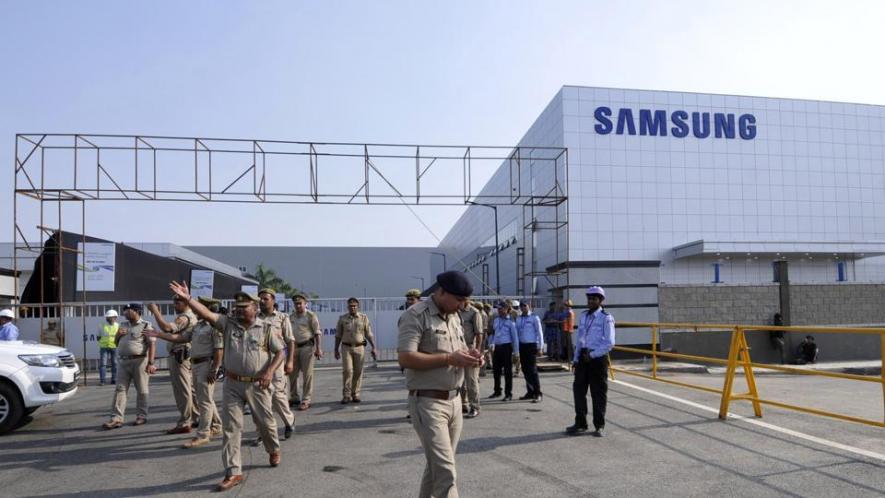New Samsung Factory in Noida: Another Example of Exploitation in the Name of ‘Ease of Business’?

Prime Minister Narendra Modi and South Korean President Moon Jae-in are all set to inaugurate Samsung’s expanded factory in Noida Sector 81 today. It is being billed as the world’s largest mobile phone production unit in terms of number of devices rolled out every month.
Samsung has put in Rs. 4,915 crore in expanding the unit, this unit will also make products that will be sold not only in India but also will be exported to Europe, West Asia and Africa. An expansion of up to 35 acres adjacent to the existing unit has been made.The company is currently making 67 million smartphones in India and with the new plant being functional, it is expected to manufacture nearly 120 million mobile phones. Not just mobiles, the expansion of the current facility will double Samsung’s production capacity of consumer electronics like refrigerators and flat panel televisions, further consolidating the company’s leadership in these segments. Samsung, in India for 20 years, has two factories in Noida and Tamil Nadu, where it makes 90% of the handsets it sells in the country. It employs some 45,000 employees.
GD Sharma, from the Centre of Indian Trade Unions (CITU) while speaking to NewsClick talked about the conditions of workers in the Samsung factory in Noida, he said the employees are often made to work for upto 12 hours. About 1000 workers in the factory are contract workers, who are not paid even minimum wages, and don’t get any of the benefits enjoyed by the permanent workers. Workers who in the past have attempted to unionise were fired by the company and currently there is no union in the factory.
Regarding the conditions of workers in an LG electronics factory in Greater Noida, the Public Union of Democratc Rights had issued a report in 2016. In the report, PUDR highlighted the conditions of working people there. According to the report the workers have nearly stagnant wages and strenuous work conditions. The report shed light on how each worker in the factory put in about 25-40 minutes of extra work each day, which was completely unpaid for.
“…… The rise in intensity of work can be gauged by the fact that around 2003-05 nearly 300 workers produced 1000 units of products per day but today, the production has risen to 2500 units whereas the number of workers undertaking this production has fallen to 180.“ the report said.
The report also showed how the company used various tricks to prevent the workers from forming a trade union, which is a fundamental right granted by the constitution. When the workers made a charter of demands and elected 11 representatives for negotiation and registration of their trade union, the management started paying 150 employees, including the representatives, a ‘supervisory allowance’(without changing their actual wages). They also refused to see the workers’ charter of demands. The matter was taken up by the Deputy Labour Commissioner (DLC), where the management opposed the demands by saying that some of the leaders had no right to ‘represent’ the workers as they were receiving salaries as per supervisory grade and were performing supervisory roles. The DLC ruled in favour of the management. Further, based on the order of the DLC, the workers’ application for registration of the Union was also rejected.
The new Samsung factory is being looked on by many as a victory of the ‘Make in India’ scheme, however this is far from the truth, in fact, the electronic devices would not be made in the factory units but merely will be assembled there, while the component parts will be sourced from other samsung outlets located abroad. It is well known that multinational corporations set up units in developing countries primarily because of the availability of cheap labour.
According to Hari Om Rai, chairman and managing director of LAVA, an Indian Smartphone company “... India has a large consumption base, low labour wages, minimal skill-sets required in electronics manufacturing and large pool of software engineers. This puts India at an advantageous position to become the global hub for electronics manufacturing.”
The Modi government, under the pretext of ‘ease of doing business’, has diluted several labour laws, which allows companies to carry out unhindered exploitation of the workers.
Get the latest reports & analysis with people's perspective on Protests, movements & deep analytical videos, discussions of the current affairs in your Telegram app. Subscribe to NewsClick's Telegram channel & get Real-Time updates on stories, as they get published on our website.
























